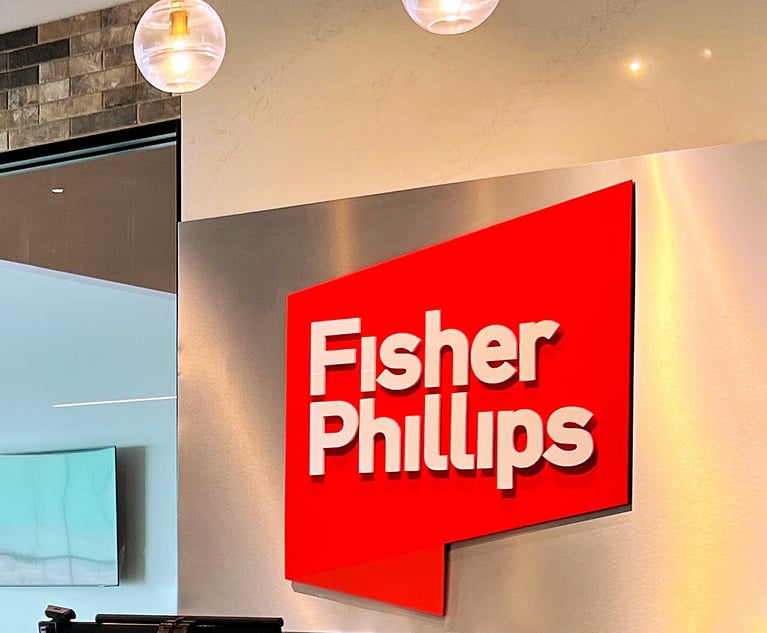The Seven Deadly Sins of Lawyers, No. 6: Greed
Mid-representation changes in the amount or terms of a fee may be subject to heightened scrutiny.
April 15, 2019 at 12:21 PM
7 minute read
 Shari Klevens (left) and Alanna Clair, Dentons. (Courtesy photo)
Shari Klevens (left) and Alanna Clair, Dentons. (Courtesy photo)
The punchlines of some “lawyers' jokes” focus on attorneys' perceived greed: overcharging clients, enjoying flashy lifestyles or abusing expense accounts. Although such a view may be dated in 1980s-era “Greed is Good” dynamics, there are many regulations and rules that govern attorneys' use of and proximity to fees or other funds derived from an attorney-client relationship.
This installment of the series regarding the “Seven Deadly Sins of Lawyers” focuses on “greed” and the risks for attorneys who are imprecise or unscrupulous when it comes to billing clients. Notably, the practice of law is a business, and law firms and lawyers typically try to structure their fees to support their practice and reflect their skill. However, given the uniquely personal nature of the attorney-client relationship, there are still some considerations governing attorneys' setting, collection, and processing of fees.
Setting the Fee
The Model Rules of Professional Conduct recommend communicating the proposed fee in advance to the client, in writing, at the onset of a representation or shortly after the representation begins. Model Rule 1.5(b). There is a well-recognized exception, however, for situations in which an attorney is beginning a new matter on behalf of “a regularly represented client on the same basis or rate.” Rule 1.5(b). This is because “[w]hen the lawyer has regularly represented a client, they ordinarily will have evolved an understanding concerning the basis or rate of the fee and the expenses for which the client will be responsible.” Rule 1.5, cmt. [2].
Model Rule 1.5 describes numerous factors to be considered in setting a reasonable fee, including: the time and labor required, the novelty of the legal questions involved, the fee charged in the locality for similar services, the time limitations posed by the representation or other circumstances, the experience and reputation of the attorney, and others. The factors identified in Model Rule 1.5 are not meant to be exhaustive, and no one factor is considered the most important.
For contingent fees, the Model Rule notes that such a fee “shall be in a writing signed by the client and shall state the method by which the fee is to be determined, including the percentage or percentages that shall accrue to the lawyer in the event of settlement, trial or appeal; litigation and other expenses to be deducted from the recovery; and whether such expenses are to be deducted before or after the contingent fee is calculated.” Rule 1.5(c). As with many other communications, the critical focus is typically ensuring that the client is well-informed as to the terms of the representation and which fees or expenses are to be borne by the client or by the attorney.
Contingent fees have additional requirements in that they may not be permissible in certain contexts. Indeed, a contingent fee is improper for a criminal representation of a defendant or in a domestic relations matter in which the fee is contingent upon the securing a divorce or a specific amount of alimony or support. Rule 1.5(d).
Midrepresentation changes in the amount or terms of a fee may be subject to heightened scrutiny. Indeed, if an attorney seeks to significantly raise his or her hourly rate or increase the favorability of the fee terms in the attorney's favor during the course of the relationship, the bar or a court may subsequently review whether the attorney was taking advantage of a vulnerable client in doing so. For example, if an attorney suddenly hikes the fee on the eve of trial, when the client may have difficulty in finding replacement counsel, the client could argue that the increased fee is the byproduct of duress or otherwise indicates that the attorney was financially enriching themselves at the expense of a susceptible client. Such concerns are generally not present, however, with regard to routine or regular rate increases, such as a yearly increase of the hourly rate. Some attorneys will include in their engagement letters that such yearly increases are expected to occur.
Many attorneys and firms charge new clients deposits or retainers against which the attorney will bill during the course of the representation. Typically, if the attorney-client relationship ends before the entire retainer has been billed, the attorney may have obligations to return those funds to the client. Model Rule 1.16(d).
Financial Hygiene
A common basis for bar complaints or claims against attorneys involves allegations that an attorney did not engage in good financial hygiene, meaning the attorney did not segregate funds or store them in accordance with the rules of conduct.
ABA Model Rule of Professional Conduct 1.15(a) calls on attorneys to hold client property separate from the attorney's own property. Typically, this means keeping client funds (such as a settlement amount or an advanced and unearned fee) in a separate bank account from the attorney's operating account. States vary regarding how long attorneys must maintain complete records of their account funds, but the Model Rule suggests a period of five years after termination of the representation.
Generally speaking, the attorney may deposit his or her own funds into a client trust account to pay bank service charges and may withdraw those funds that the attorney has earned as fees. But all such actions are typically subject to advanced scrutiny akin to the professional fiduciary relationship between attorney and client. For example, although an attorney is permitted to withdraw or retain funds that the attorney reasonably believes represents fees owed, “a lawyer may not hold funds to coerce a client into accepting the lawyer's contention” that fees are owed. Cmt. [3] to Model Rule 1.15. If there is a dispute, the Model Rules recommend holding the disputed portion of the funds in a trust account and revising the dispute promptly, such as through arbitration. Id.
By paying attention to the rules regarding the sanctity of the fee, attorneys can help foreclose any post hoc critiques of their policies.
(Editor's note: We must confess to a deadly sin of our own. Shari Klevens and Alanna Clair turned this article in, as usual, a week before the publishing date. But we simply forgot to edit and publish it. So readers received their column on No. 7, envy, before this column on No. 6.)
Shari L. Klevens is a partner at Dentons US in Atlanta and Washington, D.C., and serves on the firm's U.S. board of directors. She represents and advises lawyers and insurers on complex claims and is co-chair of Dentons' global insurance sector team.
Alanna Clair, also a partner at Dentons US in Washington, focuses on professional liability and insurance defense. Klevens and Clair are co-authors of “The Lawyer's Handbook: Ethics Compliance and Claim Avoidance” and the upcoming 2019 edition of “Georgia Legal Malpractice Law.”
This content has been archived. It is available through our partners, LexisNexis® and Bloomberg Law.
To view this content, please continue to their sites.
Not a Lexis Subscriber?
Subscribe Now
Not a Bloomberg Law Subscriber?
Subscribe Now
NOT FOR REPRINT
© 2024 ALM Global, LLC, All Rights Reserved. Request academic re-use from www.copyright.com. All other uses, submit a request to [email protected]. For more information visit Asset & Logo Licensing.
You Might Like
View All
On the Move: Hunton Andrews Kurth Practice Leader Named Charlotte Managing Partner
6 minute read
Husch Blackwell, Foley Among Law Firms Opening Southeast Offices This Year
9 minute read

Trending Stories
- 1Tuesday Newspaper
- 2Judicial Ethics Opinion 24-85
- 3Decision of the Day: Administrative Court Finds Prevailing Wage Law Applies to Workers Who Cleaned NYC Subways During Pandemic
- 4Trailblazing Broward Judge Retires; Legacy Includes Bush v. Gore
- 5Federal Judge Named in Lawsuit Over Underage Drinking Party at His California Home
Who Got The Work
Michael G. Bongiorno, Andrew Scott Dulberg and Elizabeth E. Driscoll from Wilmer Cutler Pickering Hale and Dorr have stepped in to represent Symbotic Inc., an A.I.-enabled technology platform that focuses on increasing supply chain efficiency, and other defendants in a pending shareholder derivative lawsuit. The case, filed Oct. 2 in Massachusetts District Court by the Brown Law Firm on behalf of Stephen Austen, accuses certain officers and directors of misleading investors in regard to Symbotic's potential for margin growth by failing to disclose that the company was not equipped to timely deploy its systems or manage expenses through project delays. The case, assigned to U.S. District Judge Nathaniel M. Gorton, is 1:24-cv-12522, Austen v. Cohen et al.
Who Got The Work
Edmund Polubinski and Marie Killmond of Davis Polk & Wardwell have entered appearances for data platform software development company MongoDB and other defendants in a pending shareholder derivative lawsuit. The action, filed Oct. 7 in New York Southern District Court by the Brown Law Firm, accuses the company's directors and/or officers of falsely expressing confidence in the company’s restructuring of its sales incentive plan and downplaying the severity of decreases in its upfront commitments. The case is 1:24-cv-07594, Roy v. Ittycheria et al.
Who Got The Work
Amy O. Bruchs and Kurt F. Ellison of Michael Best & Friedrich have entered appearances for Epic Systems Corp. in a pending employment discrimination lawsuit. The suit was filed Sept. 7 in Wisconsin Western District Court by Levine Eisberner LLC and Siri & Glimstad on behalf of a project manager who claims that he was wrongfully terminated after applying for a religious exemption to the defendant's COVID-19 vaccine mandate. The case, assigned to U.S. Magistrate Judge Anita Marie Boor, is 3:24-cv-00630, Secker, Nathan v. Epic Systems Corporation.
Who Got The Work
David X. Sullivan, Thomas J. Finn and Gregory A. Hall from McCarter & English have entered appearances for Sunrun Installation Services in a pending civil rights lawsuit. The complaint was filed Sept. 4 in Connecticut District Court by attorney Robert M. Berke on behalf of former employee George Edward Steins, who was arrested and charged with employing an unregistered home improvement salesperson. The complaint alleges that had Sunrun informed the Connecticut Department of Consumer Protection that the plaintiff's employment had ended in 2017 and that he no longer held Sunrun's home improvement contractor license, he would not have been hit with charges, which were dismissed in May 2024. The case, assigned to U.S. District Judge Jeffrey A. Meyer, is 3:24-cv-01423, Steins v. Sunrun, Inc. et al.
Who Got The Work
Greenberg Traurig shareholder Joshua L. Raskin has entered an appearance for boohoo.com UK Ltd. in a pending patent infringement lawsuit. The suit, filed Sept. 3 in Texas Eastern District Court by Rozier Hardt McDonough on behalf of Alto Dynamics, asserts five patents related to an online shopping platform. The case, assigned to U.S. District Judge Rodney Gilstrap, is 2:24-cv-00719, Alto Dynamics, LLC v. boohoo.com UK Limited.
Featured Firms
Law Offices of Gary Martin Hays & Associates, P.C.
(470) 294-1674
Law Offices of Mark E. Salomone
(857) 444-6468
Smith & Hassler
(713) 739-1250






